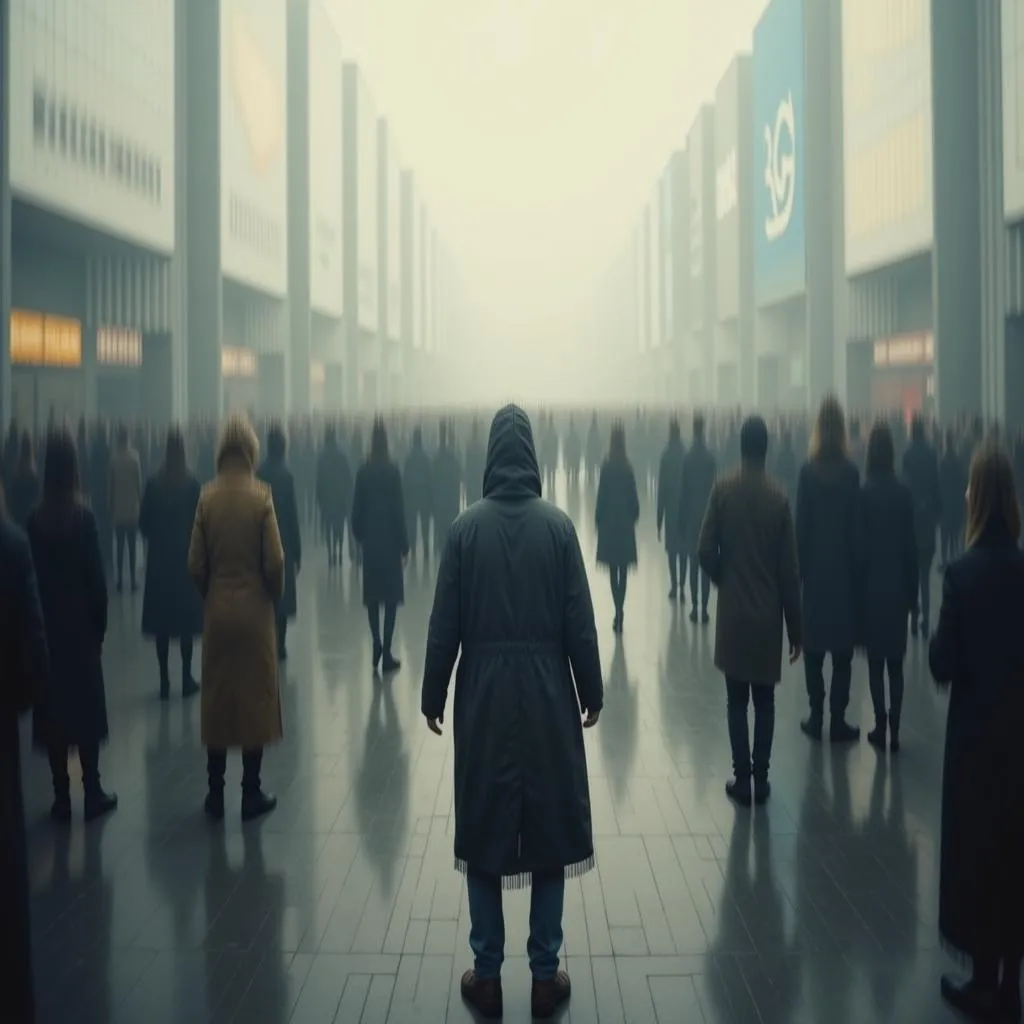The question “What Is The Opposite Of Society?” seems straightforward at first glance. We often think of “opposite” in terms of simple binaries: hot/cold, up/down, light/dark. But society, a complex web of relationships, institutions, and shared experiences, defies such easy categorization. To unearth a true “opposite,” we must delve into the core of what society represents.
Beyond Simple Antonyms: Understanding the Essence of Society
Society, at its heart, thrives on connection. It’s about individuals coming together, forming bonds, and creating systems of cooperation, whether based on shared values, goals, or simply the need for collective survival. This intrinsic human need for belonging fuels the formation and development of societies across cultures and history.
 Image depicting the feeling of disconnection, isolation, and loneliness
Image depicting the feeling of disconnection, isolation, and loneliness
So, if connection forms the bedrock of society, can we say that disconnection, isolation, or even solitude represent its opposite? While these concepts speak to an absence of social bonds, they don’t fully encapsulate the inverse of everything society embodies.
Exploring Potential Opposites: Individualism, Anarchy, and Nature?
One could argue that individualism stands in stark contrast to society. Where society emphasizes collective needs and shared responsibilities, individualism prioritizes personal freedom, autonomy, and self-reliance. However, even within individualistic societies, individuals still form communities and networks, albeit with a greater emphasis on personal choice and less on societal obligation.
Anarchy, the absence of government and institutionalized authority, might also appear as a potential opposite. Society, as we know it, relies on structures and hierarchies to function. Yet, anarchy, in its purest form, doesn’t necessarily negate the existence of social cooperation or human connection. It simply proposes alternative models of organization outside traditional power structures.
 Image contrasting natural landscapes with an urban cityscape
Image contrasting natural landscapes with an urban cityscape
Some might even propose nature, in its untamed and unorganized state, as the antithesis of structured, human-built society. This viewpoint positions society as something separate from and even opposed to the natural world, a perspective increasingly challenged by modern understandings of human interdependence with our environment.
The Opposite of Society: A Spectrum, Not a Single Point
Perhaps, then, the search for a singular, definitive opposite of “society” is a futile endeavor. Instead of a fixed point on a map, imagine a spectrum. At one end, we have the highly structured, interconnected, and interdependent nature of society as we commonly understand it. Moving across this spectrum, we encounter varying degrees of individualism, autonomy, and decentralization, each representing different ways in which humans organize and connect.
 Illustrative spectrum depicting varying degrees of human connection and autonomy
Illustrative spectrum depicting varying degrees of human connection and autonomy
The “opposite” of society, then, isn’t a single entity but rather a shifting landscape of possibilities, each reflecting different expressions of human individuality and collective existence. It’s about recognizing that the relationship between the individual and the collective is not a binary but a dynamic interplay, constantly evolving and redefining itself throughout history and across cultures.
Embracing the Complexity: Towards a More Peaceful Future
Ultimately, understanding that “the opposite of society” is not a singular, easily definable concept allows us to engage in more nuanced and empathetic conversations about the challenges and opportunities facing our world. It reminds us that there are many ways to be “human” and many ways to build meaningful connections with each other, even within and beyond the structures of traditional societies.
As we navigate an increasingly interconnected yet fragmented world, embracing this complexity is crucial. It allows us to move beyond simplistic binaries and engage in dialogue that recognizes the multifaceted nature of human existence and the constant interplay between individual and collective needs. This understanding forms the foundation for a more peaceful and just future, where diverse expressions of human connection can coexist and contribute to a more harmonious global community.